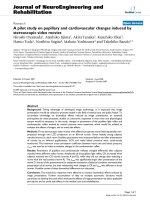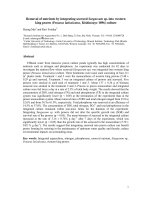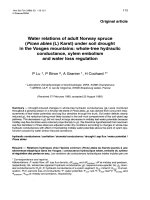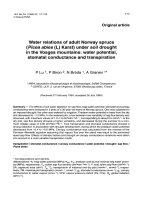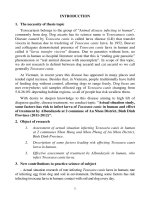Effect of organics on content and uptake of nutrients by fenugreek (Trigonella foenum-graecum l.) grown under organic farming system
Bạn đang xem bản rút gọn của tài liệu. Xem và tải ngay bản đầy đủ của tài liệu tại đây (321.05 KB, 9 trang )
Int.J.Curr.Microbiol.App.Sci (2019) 8(1): 68-76
International Journal of Current Microbiology and Applied Sciences
ISSN: 2319-7706 Volume 8 Number 01 (2019)
Journal homepage:
Original Research Article
/>
Effect of Organics on Content and Uptake of Nutrients by Fenugreek
(Trigonella foenum-graecum l.) Grown under Organic Farming System
Dhara D. Lunagariya*, V.J. Zinzala and Sandip T. Patel
N.M. College of Agriculture, Navsari, Navsari Agricultural University,
Gujarat -396450, India
*Corresponding author
ABSTRACT
Keywords
Solid organics,
Liquid organics,
Nutrient content,
Uptake
Article Info
Accepted:
04 December 2018
Available Online:
10 January 2019
A field experiment was conducted at the certified organic farm, Navsari Agricultural
University, Navsari during rabi season of 2016-2017 to study the “Effect of organics on
soil properties, growth, yield and quality of fenugreek (Trigonellafoenum-graecum L.)
grown under organic farming system”. The treatment comprising three treatment of solid
organics (S0: Control, S1: NADEP compost @ 5 t ha-1 and S2: Vermicompost @ 2.5 t ha-1)
and four treatment of liquid organics (L0: Control, L1: Panchagavya @ 20 L ha-1, L2:
Jeevamruta @ 200 L ha-1 and L3: Enriched banana pseudostemsap @ 5 L ha-1) were
evaluated in Factorial Randomized Block Design with three replication on fenugreek
variety “GM-2”. After harvest, significantly higher nutrient content (N, P, K, Mn and Zn
content in seed and N, P, K, Mn, Zn and Cu content in straw) were recorded with the
treatment S1 (NADEP compost @ 5 t ha-1) and it was at par with treatment S2
(Vermicompost @ 2.5 t ha-1) except N content in seed. Similarly, treatment receiving
NADEP compost @ 5 t ha-1 recorded significantly higher macro and micronutrient uptake
by fenugreek and statistically remained at par with treatment S 2 (Vermicompost @ 2.5 t
ha-1).Significantly higher N, K and Mn content in seed and N, P and Mn content in straw
were recorded with the treatment L3 (enriched banana pseudo stem sap @ 5 L ha-1) and
was at par with treatment L1 in case of N content in seed and Mn content in straw. L3 also
found at par with treatment L1 and L2 in case of K content in seed of fenugreek.
Application of enriched banana pseudostem sap @ 5 L ha-1 recorded significantly higher
macro and micronutrient uptake by fenugreek and statistically remained at par with
treatment L1.In case of interaction, the combined application of NADEP compost @ 5 t
ha-1 and enriched banana pseudostem sap @ 5 L ha-1 (S1L3) recorded significantly higher
fenugreek total N, P and K uptake and was found statistically at par with treatment
combination S1L1, S1L2, S2L1, S2L2 and S2L3 in case of seed and straw yield, and S1L1, S2L1
and S2L3 in case of total N, P and K uptake.
Maharashtra, Haryana, Punjab, Uttar Pradesh
and Andhra Pradesh, during winter season.
Every part of this plant is utilized as leafy
vegetable, fodder and condiments (Khiriya
and Singh, 2003). Its seeds are a good source
of protein, vitamins, alkaloid trigonellin and
Introduction
Fenugreek
(Trigonellafoenum-graecumL.),
locally known as Methi, is a multipurpose
crop grown in Northern Indian states like
Rajasthan,
Gujarat,
Madhya
Pradesh,
68
Int.J.Curr.Microbiol.App.Sci (2019) 8(1): 68-76
essential oil and have an immense medicinal
value particularly against digestive disorders
(Bhunia et al., 2006). Seeds are used for the
treatment of diabetes, dysentery, diarrhoea and
rickets. Diosgenin, which is extracted from the
seeds is used in synthesis of sex hormones. Its
roots are endowed with mini factory to
synthesize nitrogen for plant. Thus, its
cultivation enriches the soil in primary
nutrient. Plant nutrient reach to the root
surface by mass flow, diffusion, and root
interception. Microorganism play important
role in make immobilized nutrient available
form to the plant. Phosphate-solubilizing
bacteria (PSB) species like Pseudomonas
striata and Bacillus polymyxa are also
reported to be beneficial in increasing the
phosphorus availability in soil and thereby
seed yield of pulses (Gupta, 2006). Nitrogen
plays a key role in the synthesis of
chlorophyll. Nitrogen is an essential
constituent of compounds like amino acids,
proteins, nucleic acids, prophyrin, flavin,
pyridines nucleotides, enzymes, coenzymes
and alkaloids which contributes to the growth
of plant. The general role of phosphorus on
plant metabolism is known to enhance the
symbiotic nitrogen fixation.
and micronutrients, and sustain higher
productivity due to improved soil health
(Singh et al., 2006; Tiwari, 2002). In view
content and uptake of fenugreek grown under
organic farming system as evident from the
above cited literature, the present study was
carried out to find out the organics on content
and uptake by fenugreek.
Materials and Methods
A field experiment on “Effect of organics on
soil properties, growth, yield and quality of
fenugreek (Trigonellafoenum-graecum L.)
grown under organic farming system” was
carried out at Organic Farm (F block), Navsari
Agricultural University, Navsari during rabi
season of 2016-17. The soil had pH 7.78 and
electrical conductivity 0.44 dSm-1. The soil
was low in organic carbon (0.79) and available
nitrogen (258.12 kg ha-1), low in available
P2O5 (45.58 kg ha-1) and high in respect to
available K2O (273.52 kg ha-1). The
experiment was laid out in factorial
randomized block design with three
replications.
There were twelve treatment combinations
consisting of three levels of solid organics (S0:
Control, S1: NADEP compost @ 5 t ha-1 and
S2: Vermicompost @ 2.5 t ha-1) and four
levels of liquid organics (L0: Control, L1:
Panchagavya @ 20 L ha-1, L2: Jeevamruta @
200 L ha-1, L3: Banana pseudostem sap @ 5 L
ha-1). The solid organics were applied one day
before sowing and liquid organics were
incorporated in soil by drenching in the basal
as per treatments. It was sown manually at 30
cm row to row spacing keeping seed rate of 20
kg ha-1. The fenugreek variety Gujarat Methi2 was sown in December during 2016-17.
Standard agronomic practices were adopted
for raising healthy crop. Data of growth and
yield attributes were taken from 5 tagged
plants. Biological and economic yields were
taken from net plot.
Plant root releases siderophore, which are help
to make available micronutrient to the plant by
metallic bond. They have also been reported to
produce
siderophore,
antibiotics
and
exogenous compounds, which directly or
indirectly increase the growth of the crop
(Registeri et al., 2012). Sivaprakashan (1991)
reported that plant debris, farmyard manure,
and compost improved crop productivity by
improving nutrient status and soil tilth, besides
increasing microbial activity in the soil. For
sustaining soil health and productivity of soil
use different organics not only reduce the
dependence on chemical fertilizers but also
improve the soil structure, encourage the
growth and activity of beneficial organisms in
the soil, alleviate the deficiency of secondary
69
Int.J.Curr.Microbiol.App.Sci (2019) 8(1): 68-76
nutrient throughout the growth period due to
improvement in soil fertility status. These
findings are in general agreement with the
experimental results reported by Naikwade et
al., (2011), Kumar et al., (2012), Das (2014),
Naikwade (2014), Dekhane et al., (2011), Jat
et al., (2012), Kumar and Sharma (2014),
Verma et al., (2014) and Tak et al., (2014)
(Table 1).
Effect of solid organics
Significantly higher N, P, K content and
uptake by seed (2.79% and 31.89 kg ha-1),
(0.353% and 4.016 kg ha-1), (1.05% and 11.91
kg ha-1) and straw (0.89% and 18.25 kg ha-1),
(0.142% and 2.93 kg ha-1), (0.453% and 9.35
kg ha-1) were recorded under the treatment S1,
but N, P, K content and uptake by seed and
straw was at par with treatment S2 except N
content in straw. The significantly highest
total uptake of N, P and K (50.14 kg ha-1, 6.94
kg ha-1 and 21.26 kg ha-1 was found with the
application of NADEP compost @ 5 t ha-1
(S1). However, significantly lowest N, P, K
content and uptake in seed and straw were
noted under treatment S0 (Control). The data
indicated that Fe and Cu content in seed and
Fe content straw in seed of fenugreek didn’t
show significantly by the application of
different solid organics, but gave significantly
higher Fe, Mn, Zn and Cu uptake by seed and
straw. Significantly higheZrMn and Zn
content in seed (26.58 mg kg-1, 20.40 mg kg-1)
and Mn, Zn and Cu content in straw (40.23
mg kg-1, 18.47 mg kg-1, 6.20 mg kg-1) were
recorded under the treatment NADEP compost
@ 5 t ha-1 (S1) which was at par with
treatment S2. However, significantly the lowest
Mn, Zn and Cu content and uptake by seed
and straw were observed with the treatment S0
(Control) except Cu content in seed. The total
Fe, Mn, Zn and Cu uptake by fenugreek was
significantly increased with the application of
NADEP compost @ 5 t ha-1 and remained at
par with the application of vermicompost @
2.5 t ha-1 (340.62 g ha-1). Significantly the
lowest total uptake was observed under
control. Statistically remained at par with
treatment S2. The increase in nutrient content
due to addition of low C:N ratio containing
NADEP compost and vermicompost enhanced
early mineralization thus increasing the
availability of macro and micronutrient and
minimizing the fixation of plant nutrient like
phosphorus, potassium etc. These organics
also helped in steady supply of balanced
Effect of liquid organics
Application of liquid organics were also
shows significantly effect on N, P, K content
and uptake by fenugreek (Table 3). The
significantly higher N, K content in seed
(2.74%, 1.03%,) and N, P content in straw
(0.89%, 0.144%), also N, P, K uptake by seed
(30.32 kg ha-1, 3.866 kg ha-1,11.39 kg ha-1)
and by straw (17.71 kg ha-1, 2.89 kg ha-1, 9.10
kg ha-1) were recorded under the treatment L3.
while N, K content in seed, N, P content in
straw and uptake by seed and straw was at par
with treatment L1. However, significantly the
lowest N, K content in seed and N, P content
in straw were noted under the treatment L0
(Control). The data indicated that Fe, Zn and
Cu content in seed and straw of fenugreek
were not influenced significantly by the
application of liquid organics, but it was
influenced significantly on uptake by seed and
straw. The higher Fe, Zn and Cu content in
seed (43.06 mg kg-1, 20.36mg kg-1, 6.15 mg
kg-1) and straw (147.60 mg kg-1, 18.48 mg
kg-1, 6.20 mg kg-1) were found with the
treatment L3. Significantly higher Mn content
in seed (26.73 mg kg-1) and straw (39.69 mg
kg-1) were recorded under the treatment L3
which was at par with treatment L1. The
application of enriched banana pseudostem
sap @ 5 L ha-1 (L3) gave significantly higher
Fe, Mn, Zn and Cu uptake by seed and straw
and statistically at par with treatment L1.
However, significantly the lowest uptake by
seed and straw were noted with the treatment
L0 (Control).
70
Int.J.Curr.Microbiol.App.Sci (2019) 8(1): 68-76
Table.1 Effect of solid and liquid organics on N, P, K content and uptake by fenugreek
Treatment
N Content
(%)
Seed Straw
Solid organics (S)
2.31
0.82
S0
2.79
0.89
S1
2.67
0.88
S2
S.Em. (±)
0.03
0.005
CD at 5%
0.09
0.015
Liquid organics (L)
2.40
0.84
L0
2.64
0.87
L1
2.60
0.86
L2
2.74
0.89
L3
S.Em. (±)
0.03
0.006
CD at 5%
0.10
0.018
Interaction (S X L)
S.Em. (±)
0.06
0.010
CD at 5%
NS
NS
CV %
3.94
2.11
N Uptake
(kg ha-1)
Seed Straw Total
P Content
(%)
Seed Straw
P Uptake
(kg ha-1)
Seed
Straw Total
K Content
(%)
Seed Straw
K Uptake
(kg ha-1)
Seed Straw Total
18.25
31.89
29.13
0.86
2.51
11.69
18.25
17.74
0.42
1.24
29.94
50.14
46.87
1.01
2.96
0.342
0.353
0.352
0.002
0.007
0.127
0.142
0.141
0.002
0.005
2.70
4.02
3.81
0.107
0.313
1.82
2.93
2.84
0.08
0.23
4.52
6.94
6.65
0.13
0.38
0.94
1.05
1.04
0.01
0.03
0.400
0.453
0.449
0.008
0.02
7.44
11.91
11.23
0.32
0.93
5.72
9.35
9.06
0.31
0.91
13.16
21.26
20.29
0.41
1.20
20.20
28.56
26.61
30.32
0.99
2.90
12.96
16.99
15.93
17.71
0.49
1.44
33.16
45.54
42.54
48.03
1.17
3.42
0.342
0.351
0.350
0.353
0.003
NS
0.132
0.137
0.134
0.144
0.002
0.005
2.87
3.75
3.55
3.87
0.123
0.361
2.03
2.70
2.50
2.89
0.09
0.26
4.90
6.45
6.05
6.76
0.15
0.44
0.98
1.02
1.00
1.03
0.01
0.03
0.417
0.439
0.428
0.452
0.009
NS
8.26
10.92
10.20
11.39
0.37
1.07
6.44
8.66
7.98
9.10
0.36
1.05
14.69
19.58
18.18
20.49
0.47
1.39
1.71
NS
11.21
0.85
NS
9.25
2.02
5.92
8.27
0.005
NS
2.31
0.003
NS
4.01
0.213
NS
10.53
0.16
NS
10.69
0.26
0.76
7.44
0.02
NS
3.00
0.016
NS
6.32
0.63
NS
10.76
0.62
NS
13.33
0.82
2.41
7.80
Table.2 Interaction effect of solid and liquid organics on total N, P, K uptake by fenugreek
Liquid
organics
Solid
organics
L0
L1
L2
L3
S.Em. (±)
CD at 5%
CV %
Total N uptake (kg ha-1)
S0
S1
S2
26.94
38.29
34.25
31.04
53.79
51.80
29.64
51.21
46.76
32.15
57.27
54.67
2.02
5.92
8.27
Total P uptake (kg ha-1)
S0
S1
S2
4.19
5.54
4.96
4.64
7.42
7.28
4.48
6.95
6.71
4.77
7.85
7.65
0.26
0.76
7.44
71
Total K uptake (kg ha-1)
S0
S1
S2
12.33
16.72
15.03
13.51
22.98
22.25
12.99
21.19
20.36
13.80
24.14
23.52
0.82
2.41
7.80
Int.J.Curr.Microbiol.App.Sci (2019) 8(1): 68-76
Table.3 Effect of solid and liquid organics on Micronutrient content and uptake by fenugree
Treatment
Fe Content (mg kg-1)
Fe Uptake (g ha-1)
Mn Content (mg kg-1)
Mn Uptake (g ha-1)
Seed
Straw
Seed
Straw
Seed
Seed
Straw
Seed
Straw
Seed
S0
39.72
142.27
31.22
203.98
235.20
25.59
36.93
20.16
52.90
73.06
S1
42.48
147.35
48.37
302.38
350.75
26.58
40.23
30.26
82.60
112.86
S2
42.37
146.57
45.95
295.25
340.62
26.42
40.03
28.66
80.39
109.05
S.Em. (±)
0.88
2.13
1.33
7.49
7.46
0.15
0.17
0.85
1.86
3.03
CD at 5%
NS
NS
3.90
21.96
21.88
0.45
0.50
2.50
5.46
8.90
L0
40.55
143.30
34.06
219.76
253.82
25.84
38.08
21.67
58.54
80.21
L1
41.80
146.38
44.75
286.62
331.37
26.19
39.33
28.03
77.21
105.25
L2
40.69
144.32
41.20
266.64
307.84
26.02
38.89
26.39
72.20
98.59
L3
43.06
147.60
47.37
295.80
342.40
26.73
39.69
29.35
79.87
109.25
S.Em. (±)
1.01
2.45
1.53
8.64
10.38
0.18
0.20
0.98
2.34
3.50
CD at 5%
NS
NS
4.50
25.35
30.45
0.52
0.58
2.71
6.87
10.27
S.Em. (±)
1.75
4.25
2.66
14.97
17.98
0.31
0.34
1.71
4.06
6.07
CD at 5%
NS
NS
NS
NS
NS
NS
NS
NS
NS
NS
CV %
7.31
5.06
11.00
9.70
10.08
2.03
1.53
11.20
9.77
10.69
Solid organics (S)
Liquid organics (L)
Interaction (S X L)
72
Int.J.Curr.Microbiol.App.Sci (2019) 8(1): 68-76
Table.3 Continued
Treatment
Solid organics (S)
S0
S1
S2
S.Em. (±)
CD at 5%
Liquid organics (L)
L0
L1
L2
L3
S.Em. (±)
CD at 5%
Interaction (S X L)
S.Em. (±)
CD at 5%
CV %
Zn Content (mg kg-1)
Seed
Straw
Zn Uptake (g ha-1)
Seed
Straw
Total
Cu Content (mg kg-1)
Seed
Straw
Cu Uptake (g ha-1)
Seed
Straw
Total
19.74
20.40
20.29
0.15
0.45
17.91
18.47
18.29
0.11
0.32
15.54
23.21
22.01
0.62
1.83
25.63
37.89
36.73
0.94
2.75
41.17
61.10
58.74
1.53
4.48
6.08
6.15
6.13
0.04
NS
5.98
6.20
6.17
0.05
0.15
4.79
6.99
6.64
0.19
0.54
8.58
12.74
12.40
0.33
0.97
13.37
19.74
19.04
0.53
1.56
19.92
20.24
20.05
20.36
0.18
NS
18.01
18.29
18.10
18.48
0.13
NS
16.67
21.68
20.33
22.34
0.72
2.11
27.63
35.70
33.50
36.82
1.08
3.18
44.31
57.38
53.83
59.16
1.76
5.17
6.09
6.13
6.11
6.15
0.05
NS
6.03
6.16
6.08
6.20
0.06
NS
5.10
6.55
6.18
6.74
0.21
0.63
9.25
12.07
11.27
12.37
0.38
1.12
14.36
18.61
17.45
19.11
0.61
1.80
0.31
NS
2.63
0.22
NS
2.06
1.25
NS
10.65
1.88
NS
9.73
3.05
NS
9.86
0.09
NS
2.45
0.10
NS
2.95
0.37
NS
10.44
0.66
NS
10.17
1.06
NS
10.58
73
Int.J.Curr.Microbiol.App.Sci (2019) 8(1): 68-76
NADAP compost @ 5 t ha-1 or vermicompost
@ 2.5 t ha-1 along with soil application of
enriched banana pseudostem sap @ 5 L ha-1
increased nutrient content and uptake by
fenugreek and improved soil properties as
well as farmers economy grown under
organic farming system in South Gujarat
conditions.
Total Fe, Mn, Zn and Cu uptake by fenugreek
was significantly varied with different
treatment. The treatment L3 recorded
significantly higher total uptake and was at
par with treatment L1. The least value of total
uptake was recorded under control (L0).
Sreenivasa et al., (2010) reported the presence
of many beneficial microorganisms viz.,
nitrogen fixers, phosphorus solubilizers,
actinomycetes and fungi in panchagavya,
increases the availability of nutrients and
helps in absorption of these nutrients and
finally increased the total uptake. These
finding are in general agreement with the
experimental results reported by Sathish and
Paramaguru (2010), Choudhary et al., (2013),
Patil and Kolambe (2013), Salunkhe et al.,
(2013) and Boraiah et al., (2015).
References
Bhunia, S. R., Chauhan, R. P. S., Yadav, B. S.
and Bhati, A. S. (2006). Effect of
Phosphorus, Irrigation and Rhizobium
on Productivity, Water Use and
Nutrient Uptake in Fenugreek
(Trigonella
foenumgraecum
L.).
Indian Journal Agronomy, 51: 239241.
Boraiah, B., Devakumar, N., Palanna, K. B.
and Latha, B. (2015). Influence of
composted coir pith, farmyard manure
and panchagavya application to
capsicum on soil chemical properties.
Indian Journal of Agricultural
Innovation and Research, 3(5): 23191473.
Choudhary, K. M., Patel, M. M. and Pagar,
R.D. (2013). Effect of foliar
application of panchagavya and leaf
extracts of endemic plants on
groundnut (Arachis hypogaea L.).
Legume Research, 37(2): 223-226.
Das, N. (2014). Compost (Biodegradable
Waste Management Methods) as a
means of sustainable agriculture in
North-Eastern Region of India.
Research Journal of Agriculture and
Environmental Management, 3(7):
334-339.
Dekhane, S. S., Khafi, H. R., Raj, A. D. and
Parmar R. M. (2011). Effect of
biofertilizers and fertility levels on
yield, protein content and nutrient
uptake of cowpea (Vigna unguiculata
L. Walp). Legume Research. 34(1):
Interaction effect
The interaction of solid and liquid organics on
N, P and K content and uptake by seed and
straw of fenugreek were found to be nonsignificant, but total N, P and K uptake by
fenugreek was found to be significant (Table
3). The combined application of NADEP
compost @ 5 t ha-1 + enriched banana pseudo
stem sap @ 5 L ha-1 (S1L3) produced
significantly higher total N uptake (57.27 kg
ha-1), P uptake (7.85 kg ha-1) and K uptake
(24.14 kg ha-1) and statistically remained at
par with treatment combination S1L1, S2L1and
S2L3. The significantly lower total N, P and K
uptake by fenugreek was noted under
treatment S0L0 (Control). These results might
be due to promoting effect of combined
applied solid and liquid organics on early
availability of nutrients in to the soil, resulted
higher uptake of nutrient by the crop. These
results are corroborating well with the result
of Rajanna et al., (2011), Patil et al., (2012)
and Laharia et al., (2013) (Table 2).
It is concluded on the basis of results obtained
in present investigation, application of
74
Int.J.Curr.Microbiol.App.Sci (2019) 8(1): 68-76
51-54.
Gupta, S. C. (2006). Effect of Combined
Inoculation on Nodulation, Nutrient
Uptake and Yield of Chickpea in
Vertisol. Journal of Indian Society
Soil Science, 54: 251-254.
Jat, S. L., Prasad, K. and Parihar, C. M.
(2012).Effect of organic manuring on
productivity and economics of
summer mungbean. Annals of
Agricultural Research. 33(1 &3): 1720.
Khiriya, K. D. and Singh, B. P. (2003). Effect
of Phosphorus and Farmyard Manure
on Yield, Yield Attributes and
Nitrogen, Phosphorus and Potassium
Uptake of Fenugreek (Trigonella
foenum-graecumL.). Indian Journal of
Agronomy, 48: 62-65.
Kumar, A., Kumar, A., Kumar, V., Singh, B.,
Chauhan, P. and Tripathi, S. K.
(2012). Study of different sources for
enrichment of compost through
NADEP.
Society
for
Recent
Development in Agriculture, 12(2):
365-369.
Kumar, D. and Sharma, Y. (2014).Effect of
vermicompost and phosphorus on
nutrient content, uptake and quality in
fenugreek (Trigonella foenumgraecum
L.). An Asian Journal of Soil Science,
9(2): 276-279.
Laharia, G. S., Patil, D. U. and Damre, P. K.
(2103).Effect of organic sources on
fertility, nutrient uptake and yield of
soybean. Crop Research, 45(1,2&3):
155-159.
Naikwade, P. V. (2014) Evaluation of leaf
litter compost and vermicompost on
yield and nutrient uptake of trigonella.
Indian Journal of Applied Research,
4(2): 76- 80.
Naikwade, P. V., Mogle, U. and Jadhav, B.
(2011). Comparative study of aerobic
and anaerobic composts prepared from
autumn leaves on Zea mays L. Science
Research Reporter, 1(2): 77-82.
Patil, D. U., Laharia, G. S. and Damre, P. R.
(2012). Effect of different organic
sources on biological properties of
soil, nutrient uptake, quality and yield
of soybean. An Asian J. Soil Sci., 7(2):
190-193.
Patil, T. D. and Kolambe, B. N. (2013). Effect
of rates of castor cake and banana
pseudostem sap on the nutrient
concentration, uptake and yield of
organic garlic (Allium sativum L.). An
Asian Journal of Soil Science, 8(2):
264-269.
Rajanna, G. A., Murali, K., Gopakalll, P.,
Divya, M., Lakshmipathy, R. N. and
Sudakara, T. M. (2011). Effect of
different sources and time of
application of organic manures on
microbial population, root volume,
root dry weight and soil nutrient status
of aerobic rice. Environmental and
Ecology, 29(3): 260-1264.
Registeri, R., Taghavi, S. M. and
Banihashemi, Z. (2012). Effect of
Root Colonizing Bacteria on Plant
Growth and Fusarium Wilt in
Cucumismelo. J. Agr. Sci. Tech., 14:
1121-1131.
Salunkhe, J. R., Patel, A. M., Patil, R. G. and
Pisal, R. R. (2013). Effect of banana
pseudostem sap as liquid fertilizer in
onion. Indian Journal of Agricultural
Research, 47(3): 258-262.
Sathish, G. and Paramaguru, P. (2010).
Response of bioregulants on nutrient
uptake pattern of turmeric (Curcuma
longa L.) cv. BSR 2. Madras
Agricultural Journal, 97(10-12): 312314.
Singh, Y., Singh, C. S., Singh, T. K. and
Singh, J. P. 2006.Effect of Fortified
and Unfortified Rice-straw Compost
with NPK Fertilizers on Productivity,
Nutrient Uptake and Economics of
Rice (Oryza sativa). Ind. J. Agron.,
75
Int.J.Curr.Microbiol.App.Sci (2019) 8(1): 68-76
51: 297-300.
Sivaprakashan, K. 1991. Soil Amendment for
Crop Disease Management. In: “Basic
Research
for
Crop
Disease
Management”, (Ed.): Vidyasekharan,
P. Day Publishing House, New Delhi,
India, PP. 382-404.
Sreenivasa, M. N., Naik N. M. and Bhat, S.N.
(2010) Beejamruth: A source for
beneficial bacteria. Karnataka Journal
of Agricultural science, 17(3): pp.7277.
Tak, S., Sharma, S. K. and Reager, M. L.
(2014). Effect of vermicompost and
zink on yield attributes, yield and
quality of greengram [Vigna radiate
Var. aureus (L.) Wilczek] in arid
western
Rajasthan.
International
Journal of Agricultural Sciences,
10(1): 138-141.
Tiwari, K.N. (2002). Nutrient Management
for Sustainable Agriculture. J. Ind.
Soc. Soil Sci., 50: 374-377.
How to cite this article:
Dhara D. Lunagariya, V.J. Zinzala and Sandip T. Patel. 2019. Effect of Organics on Content
and Uptake of Nutrients by Fenugreek (Trigonella foenum-graecum l.) Grown under Organic
Farming System. Int.J.Curr.Microbiol.App.Sci. 8(01): 68-76.
doi: />
76


